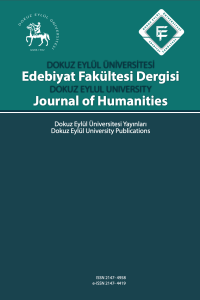Abstract
The Epic of Gilgamesh is humanity's first epic composed with environmental common sense by a literate people with extraordinary intellectual and organizational skills, as demonstrated by their construction of countless canals to cultivate the land and carry water to their settlements. Based on the life story of Gilgamesh, the two-thirds god and one-third human king of the Sumerian city-state of Uruk, it is the first text to make visible the cutting down and complete destruction of a forest. On the other hand, in the Hellenistic poem Hymn to Demeter by Callimachus, the cutting down and looting of a lush green grove by a Thessalian prince named Erysichthon is presented as the main issue. In this paper, by specifically evaluating these literary works within the atmosphere of their respective periods, it will be shown that both the Epic of Gilgamesh and the Hymn to Demeter are authentic warning texts full of instructive elements, and that literary responses to environmental problems are as old as the origin of these problems.
References
- Bulloch, A. W. (1977). Callimachus’ Erysichthon, Homer and Apollonius Rhodius. The American Journal of Philology, 98(2), 97-123.
- Bulloch, A. W. (1984). The Future of a Hellenistic Illusion: Some observations on Callimachus and religion. Museum Helveticum, 41(4), 209-230.
- Callimachus, Hymns and Epigrams. Lycophron and Aratus. (A. W. Mair & G. R. Mair, Çev.). Cambridge, MA: Harvard University Press, 1921. (Loeb Classical Library)
- Çelgin, G. (1990). Eski Yunan Edebiyatı. Remzi Kitabevi.
- Çığ, M. İ. (2013). Gilgameş Tarihte İlk Kral Kahraman. Kaynak.
- Da Silva, J. (2008). Ecocriticism and Myth: The Case of Erysichthon. Interdisciplinary Studies in Literature and Environment, 15(2), 103-116.
- Deubner, L. (1956). Attische Feste. De Gruyter.
- Howatson, M. C. (Ed.) (2013). The Oxford Companion to Classical Literature. Oxford University Press.
- Hrouda, B. (2016). Mezopotamya: Dicle ve Fırat Arasındaki Kadim Uygarlıklar. (Z. A. Yılmazer, Çev.). Alfa Kitap.
- Kramer, S. N. (1990). Tarih Sümer’de Başlar. (M. İ. Çığ, Çev.). Türk Tarih Kurumu.
- Kramer, S. N. (1999). Sümer Mitolojisi. (H. Koyukan, Çev.). Kabalcı Yayınevi.
- Maden, S. (Çev.). (2018). Gılgamış Destanı. İş Bankası Kültür Yayınları.
- McKay, K. J. (1962). Erysichthon: A Callimachaen Comedy. Brill.
- Sandars, N. K. (1973). Gılgamış Destanı. (S. Kutlu&T. Duralı, Çev.). Hürriyet Yayınları.
- Sharif, A. H., Mohammad, B. A & Saeed, I. M. (2019). Nature’s Retaliation in the Sumerian Epic Gilgamesh: An Ecocritical Study, Journal of Garmian University, 6(2), 396-403.
- Trzaskoma, S. M., Smith, R. S. & Brunet, S. (Ed.&Çev.). (2016). Anthology of Classical Myth: Primary Sources in Translation. Hackett Publishing Company.
- Wall, D. (1994). Green History: A Reader in Environmental Literature, Philosopy and Politics. Routledge.
Abstract
Gılgamış Destanı, toprağı işleyebilmek için çok sayıda kanal inşa ederek yerleşimlere su ulaştırmış olmasıyla da kendini gösteren, sıra dışı entelektüel ve organizasyonel becerilere sahip okuryazar bir halkın çevresel sağduyuyla ördüğü insanlığın ilk destanıdır. Sümer kent devleti Uruk’un üçte ikisi tanrı üçte biri ölümlü kralı Gılgamış’ın yaşam öyküsü üzerine kurulu olan Destan, bir ormanın kesilip tümüyle yok edilişini görünür kılan ilk metindir. Öte yandan, Hellenistik Dönem’de Kallimakhos tarafından yazılmış bir şiir olan Demeter’e İlahi’de ise Erysikhton adındaki bir Thessalia prensi tarafından yemyeşil bir korunun kesilip talan edilişi asıl mesele olarak sunulmuştur. Bu makalede her iki edebi eser kendi zamanlarının atmosferinde spesifik olarak değerlendirilerek, hem Gılgamış Destanı hem de Demeter’e İlahi’nin çevresel sorunlara yönelik edebi tepkilerin söz konusu sorunların kökeni kadar eski olduğunu gösteren öğretici ögelerle dolu özgün birer uyarı metni olduğu ortaya koyulmaya çalışılacaktır.
References
- Bulloch, A. W. (1977). Callimachus’ Erysichthon, Homer and Apollonius Rhodius. The American Journal of Philology, 98(2), 97-123.
- Bulloch, A. W. (1984). The Future of a Hellenistic Illusion: Some observations on Callimachus and religion. Museum Helveticum, 41(4), 209-230.
- Callimachus, Hymns and Epigrams. Lycophron and Aratus. (A. W. Mair & G. R. Mair, Çev.). Cambridge, MA: Harvard University Press, 1921. (Loeb Classical Library)
- Çelgin, G. (1990). Eski Yunan Edebiyatı. Remzi Kitabevi.
- Çığ, M. İ. (2013). Gilgameş Tarihte İlk Kral Kahraman. Kaynak.
- Da Silva, J. (2008). Ecocriticism and Myth: The Case of Erysichthon. Interdisciplinary Studies in Literature and Environment, 15(2), 103-116.
- Deubner, L. (1956). Attische Feste. De Gruyter.
- Howatson, M. C. (Ed.) (2013). The Oxford Companion to Classical Literature. Oxford University Press.
- Hrouda, B. (2016). Mezopotamya: Dicle ve Fırat Arasındaki Kadim Uygarlıklar. (Z. A. Yılmazer, Çev.). Alfa Kitap.
- Kramer, S. N. (1990). Tarih Sümer’de Başlar. (M. İ. Çığ, Çev.). Türk Tarih Kurumu.
- Kramer, S. N. (1999). Sümer Mitolojisi. (H. Koyukan, Çev.). Kabalcı Yayınevi.
- Maden, S. (Çev.). (2018). Gılgamış Destanı. İş Bankası Kültür Yayınları.
- McKay, K. J. (1962). Erysichthon: A Callimachaen Comedy. Brill.
- Sandars, N. K. (1973). Gılgamış Destanı. (S. Kutlu&T. Duralı, Çev.). Hürriyet Yayınları.
- Sharif, A. H., Mohammad, B. A & Saeed, I. M. (2019). Nature’s Retaliation in the Sumerian Epic Gilgamesh: An Ecocritical Study, Journal of Garmian University, 6(2), 396-403.
- Trzaskoma, S. M., Smith, R. S. & Brunet, S. (Ed.&Çev.). (2016). Anthology of Classical Myth: Primary Sources in Translation. Hackett Publishing Company.
- Wall, D. (1994). Green History: A Reader in Environmental Literature, Philosopy and Politics. Routledge.
Details
| Primary Language | Turkish |
|---|---|
| Subjects | Latin and Classical Greek Literature, Archaeology (Other), Environmental History |
| Journal Section | Articles |
| Authors | |
| Early Pub Date | October 17, 2024 |
| Publication Date | October 22, 2024 |
| Submission Date | June 27, 2024 |
| Acceptance Date | July 4, 2024 |
| Published in Issue | Year 2024 Volume: 11 Issue: 2 |

